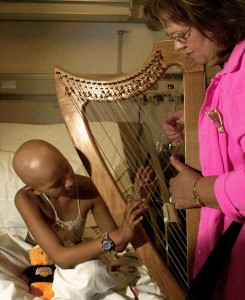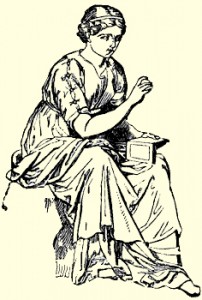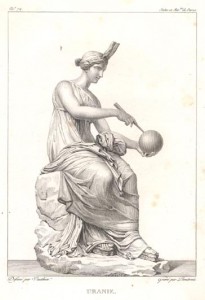Do You Know? ~ What Will I Know?
- What to do when you see the heart rate decrease in a patient?
- How to modulate out of the Ionian Mode when a patient begins to cry?
- How to raise the energy of a depressed person through modulating?
- How to identify what stage a person is in the dying process and the appropriate music for that stage?
- How to determine if you should engage the recipient in playing the instrument or conversation for that matter?
- How to keep track of what is going on with the patient without looking at the music?
- How to hold someone’s hand and play at the same time?
- How and what to play if someone is on a morphine drip?
- How to extend your instrument to a patient so that they actually get to play along with you?
- How to calm agitated patients with the use of Resonant tone and double resonance?
These are but a few of the things that all Therapeutic Harpists should know before sitting before any patient, client, or recipient.
The International Harp Therapy Program is here to prepare you to be an excellent musician with proficiencies in empathic listening, implementation of resonant tone, understandings of hospital procedures and etiquette among a wide variety of other skills.
Here is the Synopsis for what you will learn in the International Harp Therapy Program (based on many of the lectures that will be available to you through your on-line accounts).
 THE MUSES
THE MUSES
MUSE – Clio – Muse of History – the ‘glorious one’
Clio – Muse of History with the Scrolls
Our first Muse will focus on the history of music for healing and how the harp/lyre was a key in its deliverance. Lecturers including: Jeanne Martin – Mythlogy and Music and Dr. Amy Kanner – Music, Medicine and the Magic of the Harp; Music Development – How to Find the Mode of a Piece of Music
History, Mythology, Music as Medicine, Music Study
MUSE – Calliope – Muse of Epic Poetry – the ‘beautiful of speech’
Calliope – Muse of Epic Poetry – holding a tablet and stylus
Our second Muse will focus on the ability to communicate through words – our study of counseling and psychology skills. We will be studying the Dorian Mode in music development.
The study of Counseling and Psychology – creating an enabling language and NLP – Neural Linguistic Programming. This will help you understand more about yourself and interactions with others.
MUSE – Erato – Music of Love November ~ Muse-Erato (Love)
Listening Skills – Empathic communication – Alexander Technique, Self-Love Care, and Music Study – Aeolian Mode Including Lecturer: Dr. Richard McQuellon and our musical focus for this month is the Aeolian Mode.
Urania – Music of Astronomy and Astrology
Muse-Urania (Astronomy): The Power of Sound, Musical elements and overtones, Cymatics, and Music Study – Mixolydian Mode. Lecturers: Don Campbell on Spirit and Sound, Jeff Volk on Cymatics and Ani Williams on Ficino and the Hermetic traditions of Sound and Healing. Our music focus is on the Mixolydian Mode.
MUSE – Melpomene – Muse of Tragedy and beautiful singing
Muse-Melpomene (Tragedy) Hospital Etiquette – History of Hospice – Case studies, Record Keeping and Music Study – Locrian Mode. Lecturers: Deborah Noland on Hospital and Hospice Etiquette and Richard Groves – the Sacred Art of Living and Dying Program and the AnamCara Project. Our musical focus this month is the Locrian mode.
MUSE – Polyhymnia – Muse of Sacred Song

Ethics, Info on Music Therapy, Music Thanatology, Therapeutic Musicianship, Sound Healing, NSBTM, and Music Study
Lecturer: Barbara Crowe
Living Anatomy – Judith Hitt
Ionian Mode
MUSE – Euterpe – Muse of well-pleasing music and poetry
Populations served – Alzheimer’s, CP, Autism, Stroke, Rehab, Childbirth, Interactive work – Music Study – Angel Mode (Pentatonic Mode)
MUSE – Thalia – Muse of Comedy
Administrative Skills, Marketing and Music Study – Middle Eastern Mode
MUSE – Terpsichore – Muse of Dance
Preparing for your Practicum experience, How to Introduce yourself to get the internship you desire and have it turn into a future position and Music Study – Chinese Five Elements Introduction to MODULE 2 on RESONANCE STUDIES and INTERACTIVE Community Music-Making options.
RESONANCE STUDIES – EXPERIENTIAL Program
Inclusive Attention – Subtle Energy Work
Resonant Tone Identification
Hospice and Palliative Training
Music Development – Celtic Circle of Music, further Modulations
Rainbow of Sound Program – for Cancer Support Centers, Children’s Hospitals, At Risk Teen Centers, Residential Care Facilities, etc.










